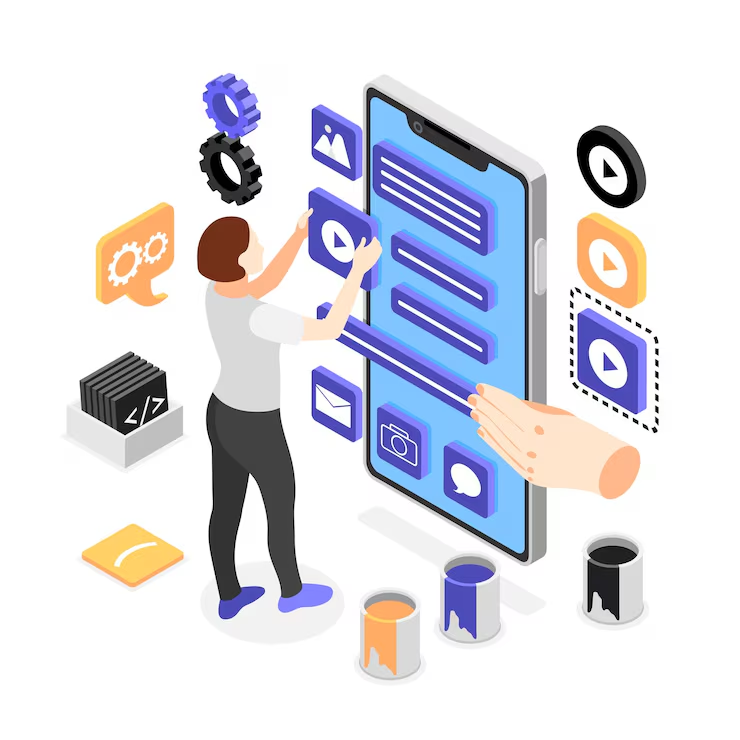Rapid Mobile App Development: All You Need to Know

Introduction
What is rapid mobile app development?
Rapid Mobile App Development is a strategy aimed at expediting the mobile app development lifecycle. It involves the use of tools, platforms, and methods that streamline the development process, enabling organizations to release apps more swiftly compared to traditional development approaches. RMAD emphasizes speed and cost-effectiveness while maintaining the functionality and reliability of the applications.
The methodology often relies on low-code or no-code platforms, minimizing the need for extensive programming and expediting the creation process. Developers, designers, and business stakeholders collaborate closely in RMAD, ensuring that apps meet both user demands and business requirements. This collaborative approach allows for quick adjustments in response to user feedback and market trends.
The importance of mobile apps for businesses
Mobile applications have become indispensable tools for businesses across industries, providing a myriad of advantages that contribute to overall success. Here are some key reasons why mobile apps are crucial for businesses:
- Improved Client Engagement: Mobile apps enable direct and personalized communication with customers through features like push notifications and in-app messaging, fostering stronger customer relationships and loyalty.
- Enhanced Accessibility: Users can access mobile apps anytime and from anywhere, leading to increased convenience and satisfaction. This accessibility significantly improves the overall user experience.
- Competitive Advantage: In a fiercely competitive market, having a mobile app can set businesses apart from their rivals. It allows companies to showcase unique offerings, stay current with trends, and provide a personalized customer experience.
- Enhanced Customer Service: Mobile apps offer self-service options, quick access to information, and real-time support, contributing to improved customer satisfaction and reduced support costs.
- Data Gathering and Analysis: Businesses can collect and analyze data from mobile apps to gain valuable insights into user behavior, preferences, and statistics. This data-driven approach enables informed decision-making and continuous improvement.
Pros and Cons of Rapid Mobile App Development
| Pros | Cons |
|---|---|
| Time-to-market is reduced | Little room for customization |
| Cost-effective | Potential issues with performance |
| Heightened agility | Dependence on outside resources |
| Streamlined development process |
Examples of rapid app development
Here are some notable examples of successful mobile applications developed using rapid app development techniques:
- Instagram: Developed using quick app development methodologies, Instagram quickly gained widespread acceptance by continuously improving its features through low-code tools and agile development.
- WhatsApp: The popular messaging app WhatsApp utilized rapid Android development methods, employing agile approaches and fast prototyping to create a user-friendly networking system.
- Uber: Uber, a leading ride-sharing and delivery service, employed fast app development techniques to create a scalable and reliable mobile application. Low-code technologies and ongoing testing ensured a seamless user interface and efficient service delivery.
- Airbnb: Airbnb utilized rapid Android development methods to build an intuitive platform. Agile approaches and incremental design allowed the platform to accommodate a growing user base, add new features quickly, and enhance user experiences.
Tools Used in Rapid App Development
Several tools and platforms facilitate rapid mobile app development. Here are some widely used tools:

- Alpha Anywhere: A comprehensive low-code platform that enables the rapid development of cross-platform mobile applications with a user-friendly interface, strong database management capabilities, and integrated security measures.
- Flutter: An open-source SDK developed by Google, Flutter supports the simultaneous development of Android and iOS apps using the programming language Dart. It features a “Hot reload” function for quick updates and supports the creation of complex widgets.
- Appery.io: An online platform offering a visual framework for developing mobile and flexible web apps. It provides a drag-and-drop experience, integration with back-end solutions, and supports real-time previewing.
- Buzztouch: A free platform for creating native iOS and Android applications, Buzztouch includes a web-based content management system (CMS) for easy customization of app appearance and features.
- React Native: An open-source mobile programming tool developed by Meta, React Native enables the creation of JavaScript-based apps for Android and iOS. It supports rapid prototyping and native app development.
- Mobile Frame: A free framework for mobile app development that facilitates business-grade smartphone app creation. It supports interactive design, offline functionality, and secure identification.
- Xamarin: A cross-platform programming framework that allows developers to create native mobile apps using C# and .NET. Xamarin facilitates code sharing between Windows, iOS, and Android platforms.
- Android Studio: Google’s tool for building Android-specific apps, Android Studio provides a stable, secure, and fast environment for app development. It features a drag-and-drop interface and supports various capabilities.
- Framework 7: Originally designed for native iPhone app development, Framework 7 now supports Android applications as well. It is a free, open-source HTML framework that accelerates the creation of native apps.
FAQs
- Q1: What is Rapid Mobile App Development (RMAD)?
- A1: Rapid Mobile App Development (RMAD) is a strategy focused on accelerating the mobile app development process by utilizing tools, platforms, and methods that streamline the development lifecycle.
- Q2: Why is RMAD important for businesses?
- A2: RMAD is crucial for businesses as it reduces time-to-market, lowers development costs, enhances agility, and simplifies the development process, allowing companies to meet customer expectations more efficiently.
- Q3: What are the advantages of mobile apps for businesses?
- A3: Mobile apps provide improved client engagement, enhanced accessibility, a competitive edge in the market, enhanced customer service, and valuable data gathering and analysis capabilities.
- Q4: Can RMAD compromise app performance?
- A4: While RMAD accelerates app development, there may be potential issues with performance as the need for speed sometimes compromises functionality and reliability.
- Q5: Which companies have successfully used RMAD?
- A5: Instagram, WhatsApp, Uber, and Airbnb are examples of companies that have successfully employed RMAD to create popular and feature-rich mobile applications.
- Q6: What are some common tools used in RMAD?
- A6: Tools like Alpha Anywhere, Flutter, Appery.io, Buzztouch, React Native, Mobile Frame, Xamarin, Android Studio, and Framework 7 are commonly used in RMAD for efficient app development.
- Q7: How does RMAD enhance business agility?
- A7: RMAD enhances business agility by allowing companies to swiftly adapt to changing consumer needs, thanks to the streamlined and collaborative development process.
- Q8: Is customization limited in RMAD?
- A8: Yes, RMAD may offer fewer customization options compared to traditional development methods, as it often relies on pre-built templates and elements.
- Q9: What are the potential downsides of RMAD?
- A9: Downsides of RMAD include the dependence on outside resources, potential issues with app performance, and limited room for customization.
- Q10: How does RMAD contribute to improved client service?
- A10: RMAD contributes to improved client service by providing self-service options, rapid access to information, and real-time support through mobile applications.
Conclusion
Rapid Mobile App Development (RMAD) has emerged as a transformative methodology, revolutionizing how businesses create mobile applications. By emphasizing speed, efficiency, and collaboration, RMAD enables the rapid development of feature-rich and viable apps. Businesses can leverage the power of mobile applications to enhance brand visibility, foster customer loyalty, and drive revenue when employing the right tactics and strategies. As the mobile app landscape continues to evolve, RMAD stands as a valuable approach for organizations seeking a competitive edge in the digital marketplace.